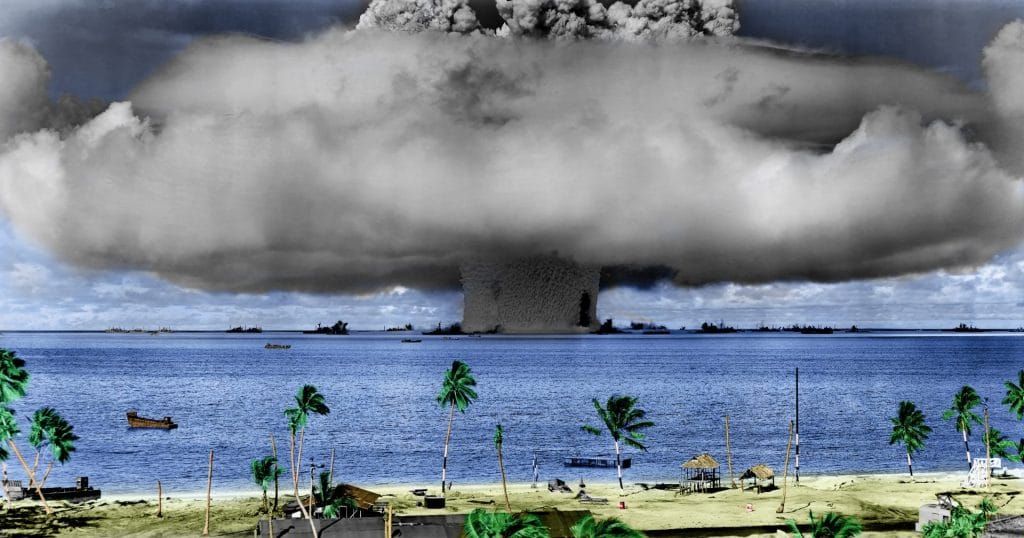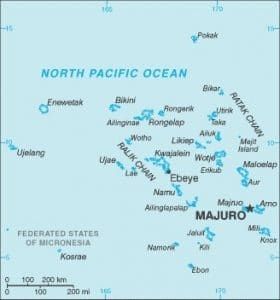After 75 years, it’s time to clean Bikini
By Hart Rapaport, Ivana Nikolić Hughes | March 9, 2021
 A nuclear weapon test by the US military at Bikini Atoll in 1946. (Credit: US Defense Department image via Wikimedia Commons, licensed with PD-USGov-Military)
A nuclear weapon test by the US military at Bikini Atoll in 1946. (Credit: US Defense Department image via Wikimedia Commons, licensed with PD-USGov-Military)
Due to their remote location in the Northern Marshall Islands, the people of Bikini Atoll were spared the worst of the mid-Pacific fighting between the American and Japanese armies in the final years of World War II. Their millennia-old culture and sustainable way of life ended abruptly when, in early 1946, Commodore Ben Wyatt, a representative of the occupying United States Navy, informed King Juda and other Bikini residents that the US would begin to test nuclear weapons near their homes. Wyatt asked the Bikinians to move elsewhere, stating that the temporary move was for “the good of mankind and to end all wars.” Though Wyatt may have believed his words to be true, the show of might by the US that followed neither ended all conflict, nor was the exodus short-lived. Seventy-five years later, Bikinians have yet to return.

Nuclear testing in Bikini and other Marshall Islands, which lasted from 1946 to 1958, received international attention at the time. In those early Cold War days, America demonstrated its nuclear prowess through images of mushroom cloud blasts towering over the Pacific on the cover of Time magazine and other prominent publications. The word Bikini infiltrated popular culture via the name of a two-piece swimsuit (named by a French designer to be “explosive”) and SpongeBob’s home, without simultaneously suffusing our conscience with an awareness of the injustices and suffering those blasts caused the Marshallese people.
It is time, finally, to recognize and right the wrongs perpetrated by the US government in the Marshall Islands. The US forced a new and dangerous technology on the native lands and peoples, without fully comprehending the short- and long-term consequences. The Marshall Islands–and Bikini specifically–ended up the site of most of the tests of US hydrogen bombs, weapons up to a thousand times more powerful than atomic bombs used in attacks on Japan in 1945. Later, when the refugees were briefly returned to Bikini after testing ended, they were exposed to harmful radiation amounts with devastating health effects.
To be sure, the US government has taken steps to monitor and address the contamination that resulted from these nuclear detonations. However, the status quo—studies by the Energy Department for the sake of scientific publications and reports, while Bikinians continue to live on other islands—is not only inadequate, but morally repugnant. Bikini is a native land and water that, over thousands of years, was critical to the people’s sustenance and the bedrock of their culture. While some of those who survived the decades of relocations are still alive, their children and grandchildren, including the descendants of King Juda, have yet to resettle their ancestral home. Without an immediate US-government-funded plan to resettle the living refugees, the millennia-long culture and history tied to the atoll may be lost forever. Also, as one of the highest lying islands in the region, Bikini could be the solution to challenges the Marshallese face from global warming and corresponding rise of sea levels.
But it’s not as simple as saying: “Let’s move the Bikinians back.” A permanent return to the atoll by a multi-generational community would risk serious health effects unless sources of remaining radiological contamination in Bikini’s fruit, soil, and lagoon are addressed and removed, according to our research at Columbia University’s K=1 Project, Center for Nuclear Studies. We have found radioactive materials throughout Bikini Atoll, resulting in background gamma radiation above the limit agreed upon by the Republic of the Marshall Islands and US and levels of cesium-137 in various fruits that violate most relevant international and domestic safety standards. Even the waters surrounding Bikini, a formerly plentiful source of food, are riddled with radioisotopes from the detonations. The cleanup may require a novel scientific approach on par with that used after the Chernobyl and Fukushima nuclear accidents. That said, a modern nuclear testing cleanup protocol may prove useful in the event of future nuclear incidents in the United States or elsewhere.
The Biden administration has promised to lead in domestic and international spheres with morals and compassion. To do so, it must engage in a truthful, comprehensive accounting of past missteps in the Marshall Islands, regardless of whether the cost of reparations and resettlement exceeds its current pledge of roughly $110 million to Bikini. Commodore Wyatt’s allegedly “temporary” displacement of Bikinians from their native land has lasted 75 years and counting. Will the Biden administration act with morals to clean remaining radioactive material from US detonations? Will it act with compassion to help Bikinians find their way home?
Together, we make the world safer.
The Bulletin elevates expert voices above the noise. But as an independent nonprofit organization, our operations depend on the support of readers like you. Help us continue to deliver quality journalism that holds leaders accountable. Your support of our work at any level is important. In return, we promise our coverage will be understandable, influential, vigilant, solution-oriented, and fair-minded. Together we can make a difference.
Keywords: Bikini, Bikini Atoll, Cold War, Marshall Islands, nuclear testing, nuclear weapons
Topics: Nuclear Risk, Nuclear Weapons

















The 1982 documentary The Atomic Cafe dealt with this.
The amazing thing is that an area so violently damaged by man can be repaired by nature. Sharks and coral have come back to Bikini and the remediation suggested in the article could only accelerate the work nature is already doing.
In 1978 I was one of the young men and teenagers tasked with the Enewetak Atoll Radiological Cleanup. I was a radiochemist, health psychics technician and during the clean up I was in charge of the soil sampling for the radiological survey. It was my work that determined what we would encase in the massive concrete containment dome or simply dump into the lagoon. With absolute certainty we did not ‘clean’ anything up, we just moved it around. Even today we do not have the tools or technology that are needed.
I too was a “young” soldier at Enewetak Atoll clean-up as flight medic, among other additional duties due to being short staffed. All too many of us have health issues because of our exposure, but it never gets proper address, only a cosmetic nod. Our Enewetak brothers have died from exposure in large numbers. Maybe someday…
Highly recommend a recent book by James Nolan, Jr. titled Atomic Doctors.
I don’t believe the Biden administration is going to stay true to it’s word about any of the above claims. It’s just business as usual. On a side note, the bombs did end all world wars which definitely would have continued if not for their invention. I believe we would have had a world war three and possibly a fourth if it weren’t for Mutually Assured Destruction.